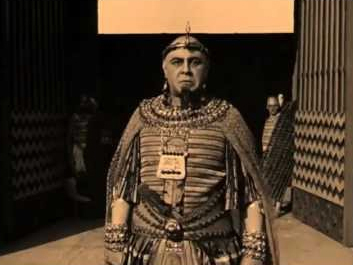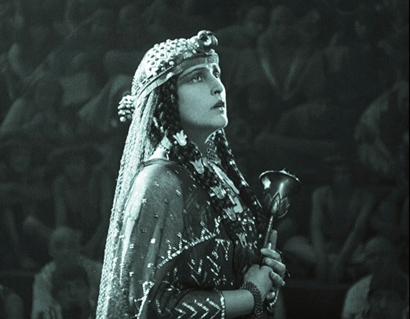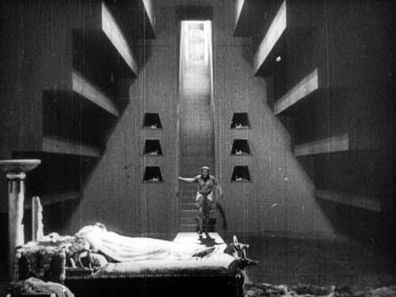
 |
|
|
|
This year's most impressive disc restoration is the reconstruction of The Loves of Pharaoh, a 1922 German epic long thought lost and unrecoverable. Filmed by director Ernst Lubitsch, the story of royal romance and intrigue in the ancient Egyptian court is every bit as "colossal" as Fritz Lang's later classic Die Niebelungen. Had screenable prints of Pharaoh not vanished early in the sound era, Lubitsch's grandiose epic would be much better known today. 
Independent distributor Alpha-Omega's Blu-ray of The Loves of Pharaoh (also on standard DVD) is a significant disc release, sure to be prized by collectors. More on the restoration of the film and the production of the disc, below. In ancient times, the Ethiopian King Samlak (Paul Wegener, famous as The Golem) and his royal entourage travel to Egypt to forge an alliance with the Pharaoh, Amenes (Emil Jannings of The Last Laugh). Samlak brings his daughter princess Makeda (Lyda Salmonova, also of The Golem) hoping that a royal marriage will confirm the alliance. But Amenes is instead love-struck by Makeda's beautiful Greek slave Theonis (Dagny Servaes). Complications ensue when Theonis meets and falls mutually in love with Ramphis (Harry Liedtke), the son of the Pharaoh's architect. They accidentally approach Amenes' treasure chamber, a crime that carries the death penalty. Ramphis is saved only when Theonis agrees to marry Amenes. The irate Samlak decides to attack Egypt with his armies, and a huge battle is enjoined. But upon discovering that his new Queen's affections lie elsewhere, Amenes goes mad and seals her into his treasure chamber! The Loves of Pharaoh --- in 1922, mind you --- offers all the thrills of a 1950s costume epic. The sets for Pharaoh's city were constructed on a grand scale in a suburb of Berlin. The size of some sets was dictated by practicality -- walls had to be tall enough to hide buildings in the modern city beyond. We see a literal cast of thousands, especially in the cleverly designed battle scenes showing waves of troops carrying wicker shields as they charge down large sand dunes - a location also fairly Berlin-adjacent, according to the program notes. The designers referenced museum exhibits to put together the film's impressive costumes, although to these eyes the beautiful Dagny Servaes' hairstyles are Teutonic in appearance. 
The Loves of Pharaoh is definitely a star vehicle, for both Emil Jannings and Paul Wegener, demanding celebrity actors of the time. Jannings' imperious Pharaoh is closed off and suspicious, but also easily swayed by his high priests. Wegener's visiting monarch is more animated and outwardly emotional, and just as capable of holding a grudge. The Ethiopians have frizzy hair and more primitive beaded costumes, but aren't specifically black. Gathering an army of black extras in 1922 Berlin was surely an impossible task. The show has a grand, operatic bearing greatly aided by a symphonic original score by Eduard Künneke, a famous composer of operas. The restoration incorporates original tinting into the scenes, a silent movie convention that helps distinguish night from day and dark interiors from those lit by candlelight. There are few camera moves, yet Lubitsch's blocking of scenes never seems constricted or limited. Some of the grand set designs are as good as any in German silent cinema. A shot of Ramphis rescuing Theonis in the treasure chamber takes place in a terrific vaulted set. A massive funeral scene is decorated with an impressive row of imperial banners. Many scenes are filmed as semi-silhouettes through ornate doorways. The epic is really a heroic love story, with Theonis and Ramphis defying the wrath of Amenes. One execution scene has Ramphis about to be crushed between two huge stones. Although no direct relationship is likely, a few ideas from The Loves of Pharaoh found their way into Howard Hawks' Land of the Pharaohs, made 33 years later. The new Queen is sealed into a treasure tomb for the crime of unfaithfulness. The young hero consults his father's architectural plans to locate a secret passage and re-enter the tomb. We see a funeral parade for dead soldiers. 
Although I've not yet read any discussion that brings up the issue, the final act of The Loves of Pharaoh reeks of star intervention. The movie comes to a logical happy finish, with the brutal Pharaoh presumed dead. According to notes in the disc release, the U.S. version terminated at this point, "because American audiences wouldn't accept an unhappy ending." In the original restored German cut shown here, the movie continues with what almost seems a new plotline. Amenes returns from the desert to reclaim his throne and his Queen, and the last reel amounts to a rebalancing of events to put Emil Jannings' character back on top. Character actor Albert Basserman plays the father of the hero -- Basserman eventually became a familiar face in American films, and has a particularly good part in Alfred Hitchcock's Foreign Correspondent, as the aged diplomat who likes to watch pigeons in the park. Alpha-Omega's deluxe Blu-ray of The Loves of Pharaoh uses imagination and showmanship to give this exotic silent classic an elaborate presentation. Both the Blu-ray and the DVD versions come in a strong box with art one might expect to see for a classical music set. This is for a reason... The inside of the box has the plastic disc holder and a large artwork still of the battle raging beneath the sphinx of Amenes' treasure tomb. An attractive 18-page glossy pamphlet contains program notes on all aspects of the show. The feature looks very good. Unlike the earlier Metropolis restorations, The Loves of Pharaoh maintains a high quality level throughout. Alpha-Omega has gone to the trouble of encoding seamless branching for ten separate sets of artwork inter-titles, for ten different languages, making this a fully international disc. The Blu-ray is Region 0 and the DVD comes either in PAL or NTSC formats. 
The extras include a new promo trailer and a photo gallery, and two very special video extras. A 38-minute making-of documentary covers the film's production story and the ten-year off-on ordeal of its restoration. Incomplete prints came from the USSR and Italy, by way of the Eastman House in Rochester. Alpha-Omega had to develop a scanner that could capture film footage from which all the sprocket holes had been torn away. The project's initial backers withdrew after much work had already been done, so Alpha-Omega took control and with new partners found a way to market the finished product. Disc releases of classic silent films have always played to a relatively small audience. Pharaoh's operatic music score by Eduard Künneke turned out to provide a major marketing solution. A second long-form video extra is a videotaped orchestra performance of the full score, conducted by arranger Frank Strobel. Viewers more interesting in auditing Künneke's music can watch the orchestra at work on the scoring stage, while snippets of the film can be seen projected behind them. So the disc does double duty as a music concert. Alpha-Omega's Thomas Bakels tells us that the restoration of The Loves of Pharaoh took a truly unpredictable path, with new sources turning up during the ten years of work. The incomplete Soviet and Italian prints that provided most of the best footage didn't overlap much in content -- the Italians had retained the love story which the Russians had mostly eliminated. The film has occasional plain expository titles to cover the content of missing footage, but most of The Loves of Pharaoh is back in one piece again.
On a scale of Excellent, Good, Fair, and Poor,
The Loves of Pharaoh Blu-ray rates:
Reviews on the Savant main site have additional credits information and are often updated and annotated with reader input and graphics. Also, don't forget the 2011 Savant Wish List. T'was Ever Thus.
Review Staff | About DVD Talk | Newsletter Subscribe | Join DVD Talk Forum |
| ||||||||||||||||||